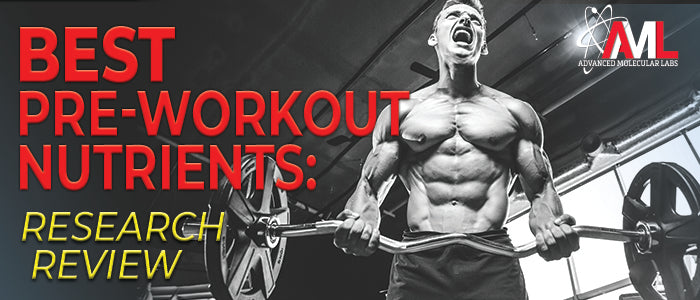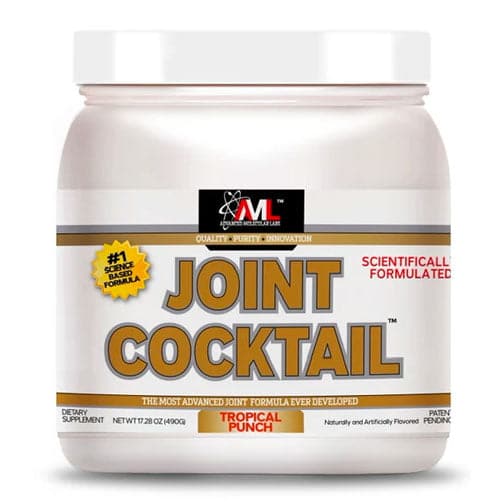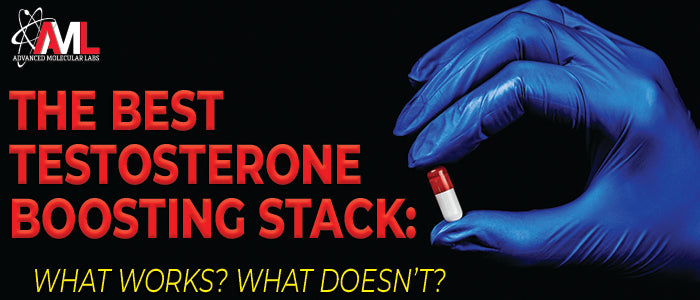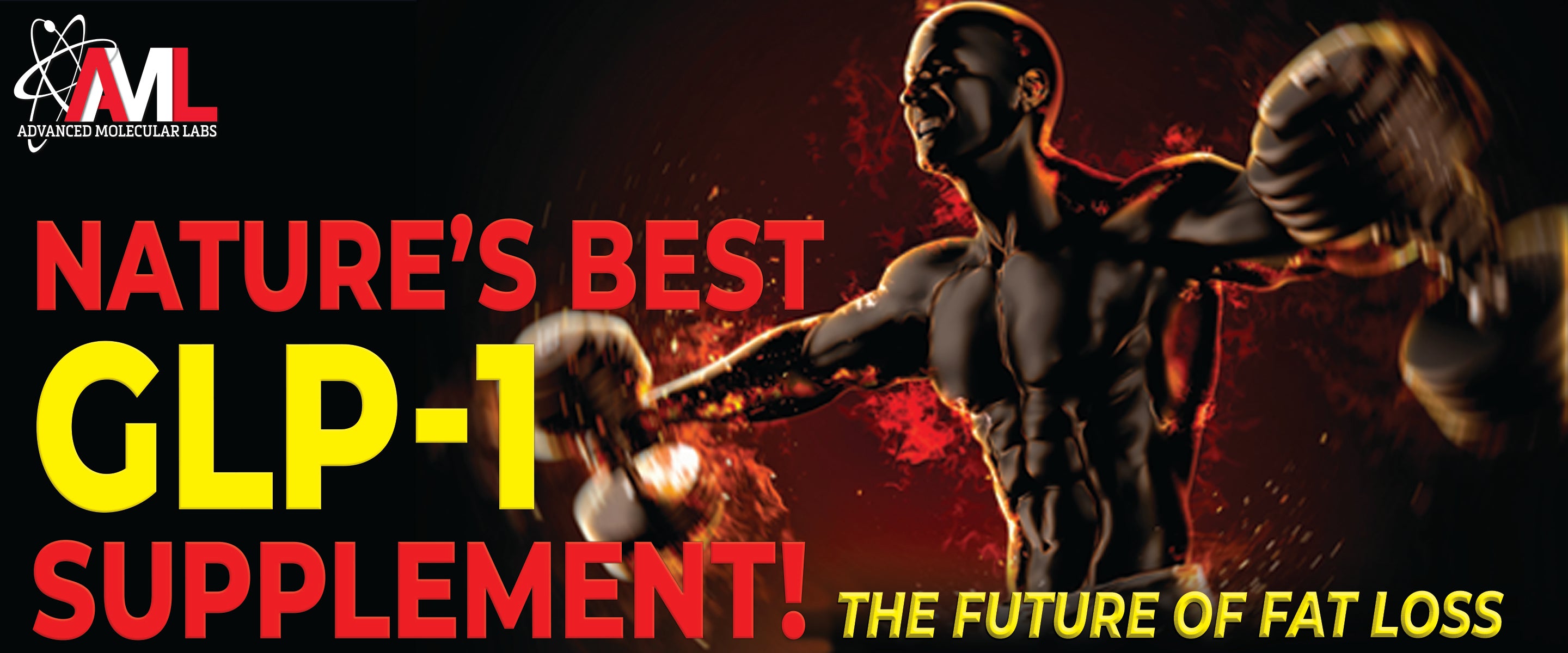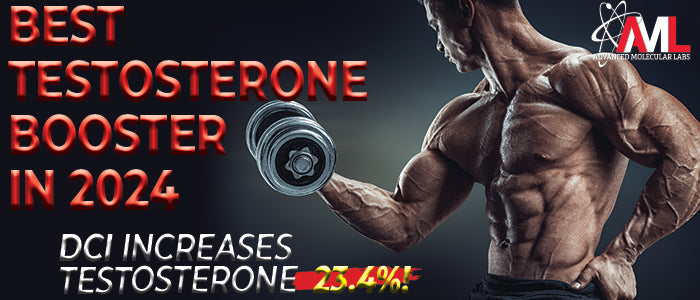

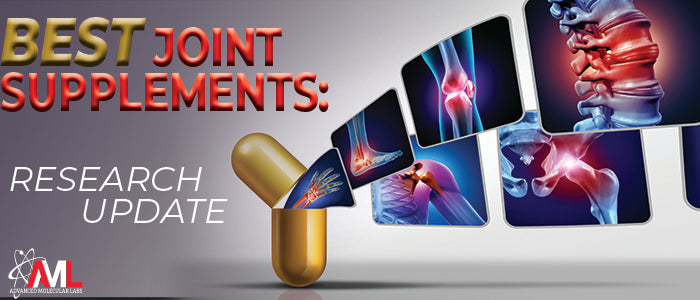
Best Joint Supplements: Research Update
By Robert Schinetsy
The number of supplements on the market that claim to support joint health is simply astounding. The issue is that many of the products on the market simply don’t use the right ingredients, and those that do use the “right” ingredients often underdose them. For instance, many joint supplements consist of only two to three capsules worth of ingredients. There simply isn’t enough space to get quality dosages of all the ingredients you want to support joint health.
AML Joint Cocktail prides itself on being the premier joint support supplement on the market rooted in science, only including those ingredients that are backed by quality studies.†
And that brings us to the topic of today’s article -- an expansive research recap on joint supplements.
Over the past few months, a number of studies have been published examining many of the ingredients utilized in Joint Cocktail.†
As you’ll soon see, the research is clear -- supplements have their place and can be beneficial for those looking to support and nourish their joints so that they can continue to train harder, recover faster, and get better results!†
Let’s get started with the best joint supplement ingredients for joint pain!
ApresFlex
Boswellia serrata is a tree that grows in the Middle East, North Africa, and India. Its resin has long been used in traditional medicines for centuries. Modern studies have indicated that the age-old plant possesses a bevy of beneficial biological activities, including: joint health.[1]
Hundreds, if not thousands, have been conducted using various boswellia extracts, and boswellic acids have been identified as the major “workhorse” compounds in the plant.
Previous research has established that boswellia extracts may be an effective and safe treatment option for joint health.[2]
New research published in the Journal of the American Nutrition Association further adds to the body of research supporting the use of boswellia extracts for those dealing with joint pain.[3]†
The 30-day randomized, double-blind, placebo-controlled trial included 70 individuals and randomized them to receive placebo or a standardized boswellia extract (Aflapin, aka ApresFlex) for 30 days.
Sixty-seven subjects completed the study, and those receiving ApresFlex noticed significant improvements in pain scores as early as five days following treatment!†
Specifically, significant improvements were seen in pain, stiffness, function, and total WOMAC (the most commonly used assessment used for joint function). Supplementation with ApresFlex decreased key inflammatory markers, including MMP-3, TNFα, and c-reactive protein.†
Hyaluronic Acid
Hyaluronic acid is a molecule that helps retain moisture. It’s involved in both joint and skin health.
New research published in Science identifies how it may also support muscle repair.
When a muscle is damaged, such as following intense exercise, stem cells work in tandem with immune cells to complete the repair process.
Exactly how these cells coordinate was previously unknown.
Researchers have now shown that hyaluronic acid is the go-between molecule that manages this necessary interaction. More specifically, the researchers found that muscle stem cells initiate repairs immediately while immune cells maintain the stem cells in a resting state. These stem cells generate hyaluronic acid and coat themselves in it. Once this hyaluronic acid coating is thick enough, it blocks the “sleep signal” from the immune cells, which forces the muscle stem cells to “wake up” and get to work.[10]
Researchers noted that if there is a way to boost endogenous production of hyaluronic acid production in muscle stem cells it may help older people with muscle recovery.
Turmeric & Other Polyphenols
Much of the discussion surrounding arthritis centers around rheumatoid arthritis or osteoarthritis. However, there is another type of arthritis that affects millions of individuals around the globe -- gout.[11]
Gout is a form of arthritis caused by a buildup of uric acid crystals (an instigator of acute inflammation) in the joints, most commonly in the big toe. As is the case with other forms of arthritis, gout can be extremely painful. There are several effective treatments for gout that can reduce disability and pain, including non-steroidal anti-inflammatory drugs (NSAIDs) and corticosteroids.
As we’ve discussed before, NSAIDs (despite their prevalence) are not without side effects and risks.
A new systematic review suggests that there may be another viable option for those looking to counter gout -- polyphenols.†
Polyphenols are found in a variety of foods that are well-documented to possess anti-inflammatory and antioxidant effects.
Curcumin, the main bioactive constituent in turmeric, has been shown to help reduce inflammation, and several studies indicate it may enhance joint health (e.g. pain and inflammation).[12,13]†
A recent year-long study investigating the potential benefits of curcumin on cartilage health found that curcumin (as Theracurmin, 180mg/day) offered significantly greater chondroprotective (cartilage-protecting) effects than placebo. This is, in part, due to curcumin’s ability to inhibit NF-kB (a major inflammatory pathway) as well as its ability to reduce MMP-13 expression and increase type II collagen expression.
Published in the Journal of Food Biochemistry, the new systematic review concluded that:
“The incidence rate of gouty arthritis has increased sharply worldwide, which has seriously affected people's quality of life. According to the current research progress, food polyphenols alleviate gouty arthritis through anti-inflammatory and antioxidant effects.”[14]
Additionally, a recently published systematic review and meta-analysis including 29 randomized controlled trials (involving 2,396 participants) found that “Curcumin and Curcuma longa Extract may improve symptoms and inflammation and joint health.”[13]†
As if that wasn’t enough, another recently published meta-analysis in the July issue of Phytotherapy Research sought to quantify the effects of curcumin supplementation on a host of biological markers, including delayed onset muscle soreness (DOMS), muscle damage, muscle strength, and joint flexibility.[27]
10 studies met the inclusion criteria established by the team of researchers. From their analysis, the team concluded that curcumin supplementation significantly improves maximal voluntary contraction as well as muscle damage and muscle soreness.[27] It was also noted that curcumin helped lower levels of creatine kinase (a marker of muscle damage) as well as improve joint flexibility.
Curcumin + Ginger
Appearing in the April 2022 issue of Nutrients, a meta-analysis investigated the impact of various nutrients and vitamins on symptoms, such as pain and stiffness, in subjects suffering from osteoarthritis.[15]†
Of particular interest was a subset of 12 studies including 724 individuals receiving curmcing vs 714 individuals receiving placebo. Researchers noted significant improvements with regard to pain and function in those subjects receiving curcumin compared to placebo.†
Ginger was among the other supplements included in the meta-analysis. Researchers noted a significant decrease in inflammatory markers (erythrocyte sedimentation rate and C-Reactive protein levels) with ginger supplementation.
Of all the nutrient and vitamin supplements reviewed, researchers concluded that curcumin and ginger supplementation can have a favorable impact on joint health symptoms.
Specifically, the researchers stated: “For now, curcumin or ginger supplementation appears to be of the most interest in terms of improving knee OA symptoms. The effects of other nutrients or nutritional supplements (omega 3, vitamins E and D) are disappointing.”†
Curcumin + Chondroitin
Chondroitin is a popular joint support supplement, but more often than not, it’s studied in combination with glucosamine (which we’ll cover in a bit). New animal research investigated the combination of curcumin + chondroitin against curcumin alone and chondroitin alone on cartilage injury and inflammation in rats.[16]
Researchers found that the combination of curcumin + chondroitin was superior to either curcumin or chondroitin alone for cartilage repair. The combination supplement also allowed rats to regain joint flexion in a shorter time and a greater improvement in range of motion!
Vitamin D
Inflammation often gets a bad rap, but the reality is that inflammation is an essential part of the body’s healing process. When the body suffers an injury, a variety of inflammatory processes activate, which protect and heal in the injured area. Things go “bad” when the inflammatory response remains elevated and isn’t allowed to return to baseline. This is called “chronic” inflammation, and chronic inflammation is involved in a host of disorders, including poor joint health.
Any number of lifestyle factors can help promote a healthy inflammatory response and limit the propensity of chronic inflammation, including diet, sleep, stress management, and regular physical activity.
Recent studies also highlight the role that Vitamin D can play in inflammation.†
Vitamin D, also known as the “sunshine vitamin”, is an essential fat-soluble vitamin and pro-hormone that has garnered significant attention in both the scientific community and lay population in recent years for its role in immune support -- a topic we’ve covered many times previously.
New research, published in the International Journal of Epidemiology, analyzed genetic data of 294,970 participants in the UK Biobank and noted an association between levels of vitamin D and C-reactive protein (CRP), an indicator of inflammation.[17] Specifically, individuals with low levels of vitamin D had higher levels of CRP.
Speaking with ScienceNews, lead researcher, Dr. Ang Zhou, remarked, “Boosting vitamin D in people with deficiencies may reduce chronic inflammation, helping them avoid a number of related diseases.”[18]†

Vitamin C
Tendinopathies represent 30–50% of all sports injuries. It is a painful condition, typically resulting from overuse, that involves the breakdown of cartilage in your tendons. As a tendon degenerates it can become a reactive oxygen species (ROS), contributing significantly to tendinopathy progression.[19]
Vitamin C, in addition to being an essential water-soluble vitamin, is a potent antioxidant that can help reduce oxidative stress. What’s more, the major molecular component (60-85%) of tendons is type 1 collagen.
Vitamin C supplementation has been shown to enhance collagen synthesis as it serves as a cofactor for two enzyme involved in collagen production -- prolyl hydroxylase and lysyl hydroxylase.[20]
A recent review, published in Nutrients, investigated the effects of vitamin C supplementation on tendinopathy recovery. The primary finding was that vitamin C supplementation is potentially useful approach for tendinopathy recovery. Furthermore, researchers noted that Vitamin C supplementation, alone or in combination with other products (such as collagen peptides), increases collagen synthesis with a consequent improvement in the patient’s condition.[21]
Vitamin C + Collagen Improves Performance
Another recent study appearing in the International Journal of Sport Nutrition and Exercise Metabolism investigated the effects of a combination of 20 grams of collagen + 50mg of vitamin C vs placebo on measures of lower body force output.[22]
This randomized, double-blind, placebo-controlled trial had 50 individuals (48 completed the study) perform the following three move complex on a force plate:
- Three maximal voluntary contractions of an isometric squat exercise
- Three repetitions of the countermovement jump
- Three repetitions of the squat jump
Each lower body exercise was separated by a 30 second rest interval, and there was a 5-minute rest interval between each complex.
Individuals consumed their supplement ∼60 minutes before training, and the supplement was taken every day of the study.
At the end of the trial, researchers found that the collagen + vitamin C supplement, in combination with combined heavy strength and power training, resulted in improved eccentric force capacity in the countermovement jump compared to placebo. More specifically, countermovement jump eccentric performance, including eccentric deceleration rapid force development and the net eccentric deceleration impulse, improved more in the collagen + vitamin C group.[22]
Glucosamine + Chondroitin
Glucosamine and chondroitin are the two “stalwart” joint supplements. They’ve been used for decades, and despite their prevalence within the supplement industry, new research continues to be carried out, something that’s unfortunately not the “norm” for supplement research. Quite often, when an ingredient is found to be effective/beneficial in a small study, or two, no other research is carried out.
That’s not the case with these two (as well as the rest of the ingredients discussed above).
A new systematic review and meta-analysis, appearing in the Archives of Orthopaedic & Trauma Surgery, assessed the safety and efficacy of the combination treatment of glucosamine + chondroitin on knee joint health.[23]†
Eights studies satisfied the inclusion criteria set forth by the researchers. While that may seem like a small number of studies, it actually included a total of 3,793 participants, with 1,067 patients receiving a combination of glucosamine and chondroitin and 2,726 individuals receiving other treatments.
The major takeaway from the meta-analysis was that “the combination of glucosamine and chondroitin is effective and superior to other treatments in knee osteoarthritis to a certain extent.”†
A separate standalone review on the possibility of glucosamine-only as a therapy for osteoarthritis, published in Frontiers in Pharmacology, found that glucosamine may benefit individuals by combating chronic low-grade inflammation.
Some other rather intriguing takeaways from the review were that individuals who regularly consumed glucosamine supplements were associated with a 27% reduction in mortality and a 58% reduction in deaths from cardiovascular causes.[24]†
Building off of the findings of the glucosamine-only review brings us to another recent study investigating the potential glucosamine + chondroitin on cardiovascular health and a blood clot that cuts off the blood supply to your brain.[25]
Researchers combed through a medical database including over 3.7 million adults and identified ~14,000 instances of stroke. They noted a reduced risk of ischaemic stroke in patients with vascular risk factors but not among those with established vascular diseases (e.g. diabetes).†
One of the mechanisms by which glucosamine + chondroitin may enhance cardiovascular health is that regular consumption may help to reduce levels of C-reactive protein -- a biomarker of systemic inflammation. Due to the anti-inflammatory potential of glucosamine + chondroitin, it may offer a preventive role in cardiovascular health.†
Glucosamine As a Potential Ergogenic?
The final study to discuss concerning glucosamine is a mouse study assessing its effects on exercise performance.[26] Researchers tested various doses of glucosamine (comparable to those doses commonly consumed by humans) on markers of mitochondrial content, physical performance, and oxidative stress in mice that were aerobically trained for 6 weeks.
Grip strength, motor coordination, and running capacity were also tracked before and after the training period.
Researchers noted that the glucosamine-treated group demonstrated increased protein levels of mitochondrial biogenesis markers, improved motor coordination, and greater exercise performance.
Furthermore, researchers noted that since glucosamine can help suppress inflammation as well as inhibiting glycolysis, it can subsequently activate the metabolism of stored fat and mitochondrial respiration.
Follow-up human studies assessing the impact of glucosamine (with or without chondroitin) are needed to further verify its potential as an ergogenic aid above and beyond its joint-related benefits.
Takeaway
AML Joint Cocktail is an advanced joint support supplement for individuals who demand the most from their bodies. The blend of synergistic nutrients includes 17 grams of active ingredients that offer unparalleled support. To put this into perspective, you’d need to consume upwards of 20 capsules, which further highlights just how ridiculously underdosed the vast majority of joint support supplements are.†
Click here to learn more about AML Joint Cocktail and what makes it the premier joint support supplement on the market!†
†These statements have not been evaluated by the U.S. Food and Drug Administration.
This product is not intended to diagnose, treat, cure or prevent any disease.
© Published by Advanced Research Media, Inc., 2022
© Reprinted with permission from Advanced Research Media, Inc.
References
- Siddiqui MZ. Boswellia serrata, a potential antiinflammatory agent: an overview. Indian J Pharm Sci. 2011 May;73(3):255-61. doi: 10.4103/0250-474X.93507. PMID: 22457547; PMCID: PMC3309643.
- Yu G, Xiang W, Zhang T, Zeng L, Yang K, Li J. Effectiveness of Boswellia and Boswellia extract for osteoarthritis patients: a systematic review and meta-analysis. BMC Complement Med Ther. 2020 Jul 17;20(1):225. doi: 10.1186/s12906-020-02985-6. PMID: 32680575; PMCID: PMC7368679
- Vasu Karlapudi, Krishna Bhagavan Sunkara, Purna Rajeswari Konda, Kadainti V. Sarma & Meher Prasanna Rokkam (2022) Efficacy and Safety of Aflapin®, a Novel Boswellia Serrata Extract, in the Treatment of Osteoarthritis of the Knee: A Short-Term 30-Day Randomized, Double-Blind, Placebo-Controlled Clinical Study, Journal of the American Nutrition Association, DOI: 1080/07315724.2021.2014370
- Li Y, Yao J, Han C, Yang J, Chaudhry MT, Wang S, Liu H, Yin Y. Quercetin, Inflammation and Immunity. Nutrients. 2016 Mar 15;8(3):167. doi: 10.3390/nu8030167. PMID: 26999194; PMCID: PMC4808895
- Appari, M., Babu, K. R., Kaczorowski, A., Gross, W., Herr, I."Sulforaphane, quercetin and catechins complement each other in elimination of advanced pancreatic cancer by miR-let-7 induction and K-ras inhibition". International Journal of Oncology 45.4 (2014): 1391-1400.
- Song FH, Liu DQ, Zhou YQ, Mei W. SIRT1: A promising therapeutic target for chronic pain. CNS Neurosci Ther. 2022 Jun;28(6):818-828. doi: 10.1111/cns.13838. Epub 2022 Apr 9. PMID: 35396903; PMCID: PMC9062570.
- Cui Z, Zhao X, Amevor FK, Du X, Wang Y, Li D, Shu G, Tian Y, Zhao X. Therapeutic application of quercetin in aging-related diseases: SIRT1 as a potential mechanism. Front Immunol. 2022 Jul 22;13:943321. doi: 10.3389/fimmu.2022.943321. PMID: 35935939; PMCID: PMC9355713
- Wong SK, Chin KY, Ima-Nirwana S. Quercetin as an Agent for Protecting the Bone: A Review of the Current Evidence. Int J Mol Sci. 2020 Sep 3;21(17):6448. doi: 10.3390/ijms21176448. PMID: 32899435; PMCID: PMC7503351
- Torre E. Molecular signaling mechanisms behind polyphenol-induced bone anabolism. Phytochem Rev. 2017;16(6):1183-1226. doi: 10.1007/s11101-017-9529-x. Epub 2017 Aug 31. PMID: 29200988; PMCID: PMC5696504.
- Kiran Nakka et al, JMJD3 activated hyaluronan synthesis drives muscle regeneration in an inflammatory environment, Science (2022). DOI: 10.1126/science.abm9735.
- Deng P, Wang S, Sun X, Qi Y, Ma Z, Pan X, Liang H, Wu J, Chen Z. Global Trends in Research of Gouty Arthritis Over Past Decade: A Bibliometric Analysis. Front Immunol. 2022 Jun 10;13:910400. doi: 10.3389/fimmu.2022.910400. PMID: 35757713; PMCID: PMC9229989.
- Daily JW, Yang M, Park S. Efficacy of Turmeric Extracts and Curcumin for Alleviating the Symptoms of Joint Arthritis: A Systematic Review and Meta-Analysis of Randomized Clinical Trials. J Med Food. 2016 Aug;19(8):717-29. doi: 10.1089/jmf.2016.3705. PMID: 27533649; PMCID: PMC5003001.
- Zeng L, Yang T, Yang K, Yu G, Li J, Xiang W, Chen H. Efficacy and Safety of Curcumin and Curcuma longa Extract in the Treatment of Arthritis: A Systematic Review and Meta-Analysis of Randomized Controlled Trial. Front Immunol. 2022 Jul 22;13:891822. doi: 10.3389/fimmu.2022.891822. PMID: 35935936; PMCID: PMC9353077.
- Zou F, Li X, Yang R, Zhang R, Zhao X. Effects and underlying mechanisms of food polyphenols in treating gouty arthritis: A review on nutritional intake and joint health. J Food Biochem. 2022 Feb;46(2):e14072. doi: 10.1111/jfbc.14072. Epub 2022 Jan 7. PMID: 34997623.
- Mathieu S, Soubrier M, Peirs C, Monfoulet LE, Boirie Y, Tournadre A. A Meta-Analysis of the Impact of Nutritional Supplementation on Osteoarthritis Symptoms. Nutrients. 2022 Apr 12;14(8):1607. doi: 10.3390/nu14081607. PMID: 35458170; PMCID: PMC9025331.
- Guan T, Ding LG, Lu BY, Guo JY, Wu MY, Tan ZQ, Hou SZ. Combined Administration of Curcumin and Chondroitin Sulfate Alleviates Cartilage Injury and Inflammation via NF-κB Pathway in Knee Osteoarthritis Rats. Front Pharmacol. 2022 May 19;13:882304. doi: 10.3389/fphar.2022.882304. PMID: 35662715; PMCID: PMC9161211.
- Ang Zhou, Elina Hyppö Vitamin D deficiency and C-reactive protein: a bidirectional Mendelian randomization study. International Journal of Epidemiology, 2022; DOI: 10.1093/ije/dyac087
- University of South Australia. "Down on Vitamin D? It could be the cause of chronic inflammation." ScienceDaily. ScienceDaily, 7 August 2022. <sciencedaily.com/releases/2022/08/220807161657.htm>.
- Yao L., Bestwick C.S., Bestwick L.A., Aspden R.M., Maffulli N. Non-Immortalized Human Tenocyte Cultures as a Vehicle for Understanding Cellular Aspects to Tendinopathy. Transl. Med. UniSa. 2011;1:173–194
- DePhillipo NN, Aman ZS, Kennedy MI, Begley JP, Moatshe G, LaPrade RF. Efficacy of Vitamin C Supplementation on Collagen Synthesis and Oxidative Stress After Musculoskeletal Injuries: A Systematic Review. Orthop J Sports Med. 2018 Oct 25;6(10):2325967118804544. doi: 10.1177/2325967118804544. PMID: 30386805; PMCID: PMC6204628.
- Noriega-González DC, Drobnic F, Caballero-García A, Roche E, Perez-Valdecantos D, Córdova A. Effect of Vitamin C on Tendinopathy Recovery: A Scoping Review. Nutrients. 2022 Jun 27;14(13):2663. doi: 10.3390/nu14132663. PMID: 35807843; PMCID: PMC9267994.
- Lis, D. M., Jordan, M., Lipuma, T., Smith, T., Schaal, K., & Baar, K. (2022). Collagen and Vitamin C Supplementation Increases Lower Limb Rate of Force Development, International Journal of Sport Nutrition and Exercise Metabolism, 32(2), 65-73. https://journalhumankinetics.com/view/journals/ijsnem/32/2/article-p65.xml
- Meng Z, Liu J, Zhou N. Efficacy and safety of the combination of glucosamine and chondroitin for knee osteoarthritis: a systematic review and meta-analysis. Arch Orthop Trauma Surg. 2022 Jan 13. doi: 10.1007/s00402-021-04326-9. Epub ahead of print. PMID: 35024906.
- Conrozier T, Lohse T. Glucosamine as a Treatment for Osteoarthritis: What If It's True? Front Pharmacol. 2022 Mar 17;13:820971. doi: 10.3389/fphar.2022.820971. PMID: 35370756; PMCID: PMC8968913.
- Mazzucchelli R, Rodríguez-Martín S, Crespí-Villarías N, García-Vadillo A, Gil M, Izquierdo-Esteban L, Rodríguez-Miguel A, Barreira-Hernández D, Fernández-Antón E, García-Lledó A, Pascual A, Vitaloni M, Vergés J, de Abajo FJ. Risk of ischaemic stroke among new users of glucosamine and chondroitin sulphate: a nested case-control study. Ther Adv Musculoskelet Dis. 2022 Jul 26;14:1759720X221113937. doi: 10.1177/1759720X221113937. PMID: 35923649; PMCID: PMC9340380.
- DE LA Rosa A, Olaso-Gonzalez G, Garcia-Dominguez E, Mastaloudis A, Hester SN, Wood SM, Gomez-Cabrera MC, Viña J. Glucosamine Supplementation Improves Physical Performance in Trained Mice. Med Sci Sports Exerc. 2022 Mar 1;54(3):466-474. doi: 10.1249/MSS.0000000000002821. PMID: 34711707.
- Beba M, Mohammadi H, Clark CCT, Djafarian K. The effect of curcumin supplementation on delayed-onset muscle soreness, inflammation, muscle strength, and joint flexibility: A systematic review and dose-response meta-analysis of randomized controlled trials. Phytother Res. 2022 Jul;36(7):2767-2778. doi: 10.1002/ptr.7477. Epub 2022 May 16. PMID: 35574627.



